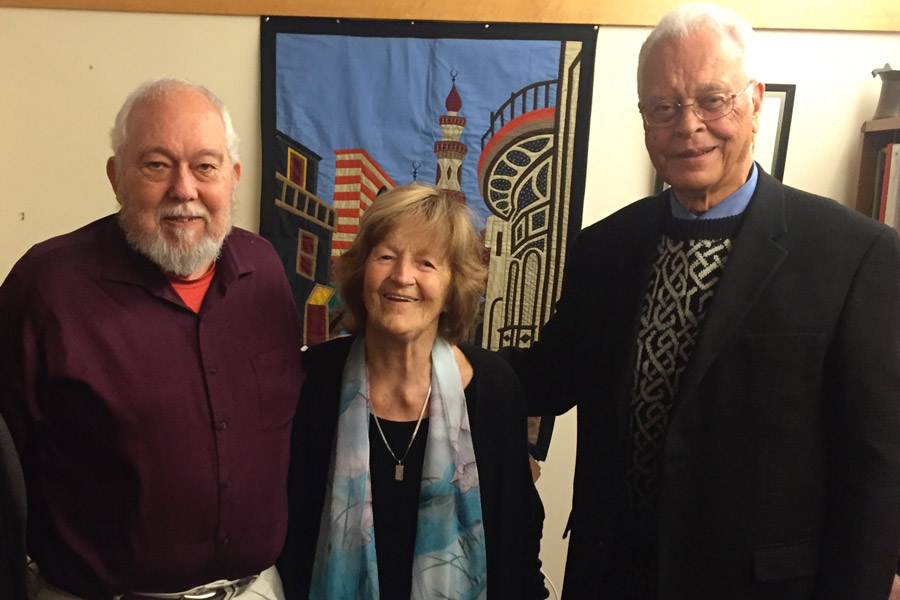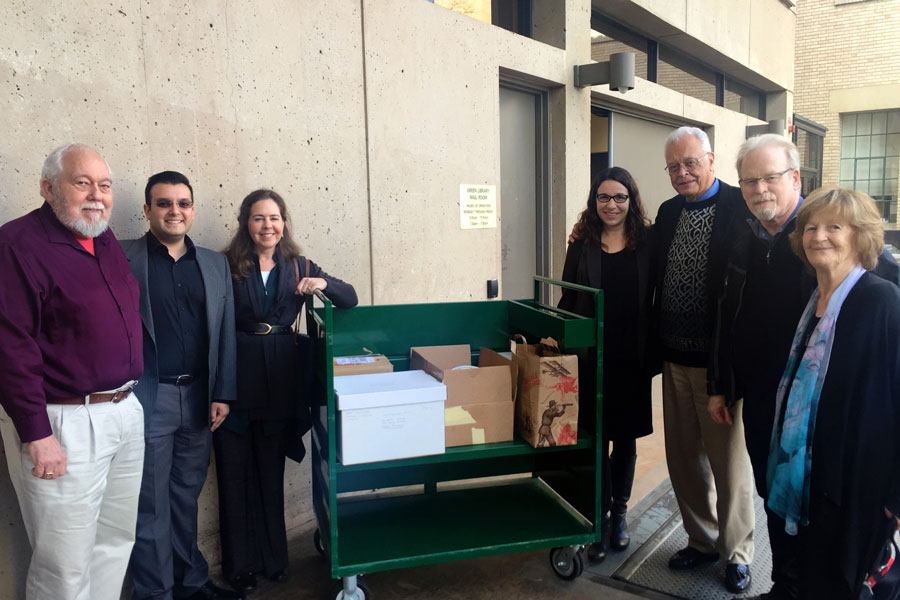The views expressed in our content reflect individual perspectives and do not represent the authoritative views of the Baha'i Faith.
Do not allow your minds to dwell on the present, but with eyes of faith look into the future, for in truth the Spirit of God is working in your midst. – Abdu’l-Baha, Paris Talks, p. 169.
In February of 2016 a group of Baha’is presented the archives that contain the life’s work of educator, psychologist and philosopher Daniel C. Jordan, the creator of the Anisa Educational Model, to the Stanford University Libraries.
Delivered personally by Dr. Jordan’s widow Nancy Jordan and his educational collaborator Donald Streets, the archives and materials contain more than a thousand documents, tapes, files and films spanning Jordan’s remarkable career in education, philosophy, human development, music and psychology. The archives include Jordan’s early work on the holistic, Baha’i-inspired Anisa Educational Project; his personal correspondence with major historical figures like the psychologist and writer Carl Jung; and his doctoral work at the University of Chicago in human development, social anthropology and psychology, for which he wrote and directed a ballet accompanied by musical score and scenario.

From L-R: John Eilts, Nancy Jordan, Don Streets. Photo credit: Deanne LaRue
“I couldn’t be more pleased,” Nancy Jordan, Dan’s widow, said, “now that Dan’s important work has found a permanent home here at Stanford.”
Dr. Daniel C. Jordan—at the age of 18 the first American ever to win a Rhodes Scholarship for music—was tragically murdered in New York in October of 1982, just after he turned 50 and had been named the Dean of the School of Education at National University in San Diego. The crime remains unsolved.
Now, though, Dan Jordan’s scientific, philosophic and educational legacy will continue in perpetuity at Stanford, which already has a long history of Baha’i activity.
A little more than a century ago, Stanford University hosted a visit and a major address from Abdu’l-Baha, son of Baha’u’llah, the prophet and founder of the Baha’i Faith. Addressing the entire student body and faculty on October 8, 1912, Abdu’l-Baha said:
The greatest attainment in the world of humanity has ever been scientific in nature. It is the discovery of the realities of things. Inasmuch as I find myself in the home of science — for this is one of the great universities of the country and well known abroad — I feel a keen sense of joy…
The highest praise is due to men who devote their energies to science, and the noblest center is a center wherein the sciences and arts are taught and studied. Science ever tends to the illumination of the world of humanity. It is the cause of eternal honor to man, and its sovereignty is far greater than the sovereignty of kings. The dominion of kings has an ending; the king himself may be dethroned; but the sovereignty of science is everlasting and without end. Consider the philosophers of former times. Their rule and dominion is still manifest in the world. The Greek and Roman kingdoms with all their grandeur passed away; the ancient sovereignties of the Orient are but memories, whereas the power and influence of Plato and Aristotle still continue. Even now in schools and universities of the world their names are revered and commemorated, but where do we hear the names of bygone kings extolled? They are forgotten and rest in the valley of oblivion. It is evident that the sovereignty of science is greater than the dominion of rulers. Kings have invaded countries and achieved conquest through the shedding of blood, but the scientist through his beneficent achievements invades the regions of ignorance, conquering the realm of minds and hearts. Therefore, his conquests are everlasting. May you attain extraordinary progress in this center of education. May you become radiant lights flooding the dark regions and recesses of ignorance with illumination.
God has created man lofty and noble, made him a dominant factor in creation. He has specialized man with supreme bestowals, conferred upon him mind, perception, memory, abstraction and the powers of the senses. These gifts of God to man were intended to make him the manifestation of divine virtues, a radiant light in the world of creation, a source of life and the agency of constructiveness in the infinite fields of existence. – Abdu’l-Baha, The Promulgation of Universal Peace, pp. 348-349, 352.
In 2012, on the 100th anniversary of Abdu’l-Baha’s visit, the Stanford Libraries established the first university-based collection of materials on the Baha’i religion in the United States, beginning with the initial donation of the Jack H. Lee and Arden T. Lee Baha’i Collection, one of the most extensive private libraries of materials related to the Faith. The collection includes thousands of books, letters, photographs and rare, out-of-print early Baha’i publications.

A small portion of the Daniel Jordan archives delivered to Stanford University Library. From L-R: John Eilts, Nicholas Mentha, Shirin Coleman, Sonia Lee, Don Streets, David Langness, Nancy Jordan. Photo credit: Deanne LaRue.
“Don Streets and Nancy Jordan have been dear friends of my parents for nearly 60 years,” said Shirin Lee Coleman, Jack and Arden Lee’s daughter. “Don and Nancy’s entrusting of their personal treasures from Dan Jordan’s life to the Jack H. Lee and Arden T. Lee Baha’i Collection at Stanford is a full-circle expression of their mutual friendship and respect, especially when these treasures could have been gifted to any of the other academic institutions Dan Jordan was affiliated with, such as Oxford or the University of Chicago.”
“The addition of Dr. Jordan’s archives is a great addition to our Baha’i collection, and will provide resources for students, scholars and researchers far into the future,” said John Eilts, curator for the libraries’ Islamic and Middle Eastern collection.
As Abdu’l-Baha said about the great philosophers and immortal educators a little more than a hundred years ago, “Even now in schools and universities of the world their names are revered and commemorated…”
















Comments
Sign in or create an account
Continue with Googleor